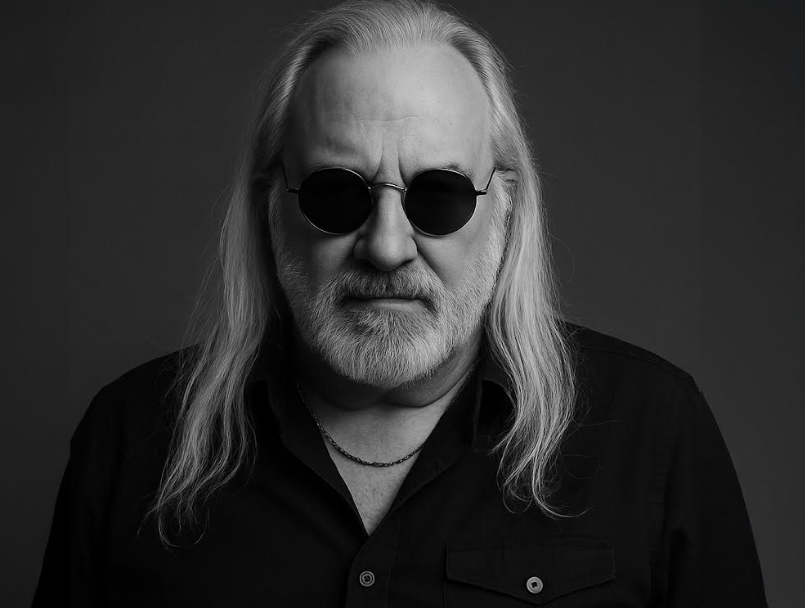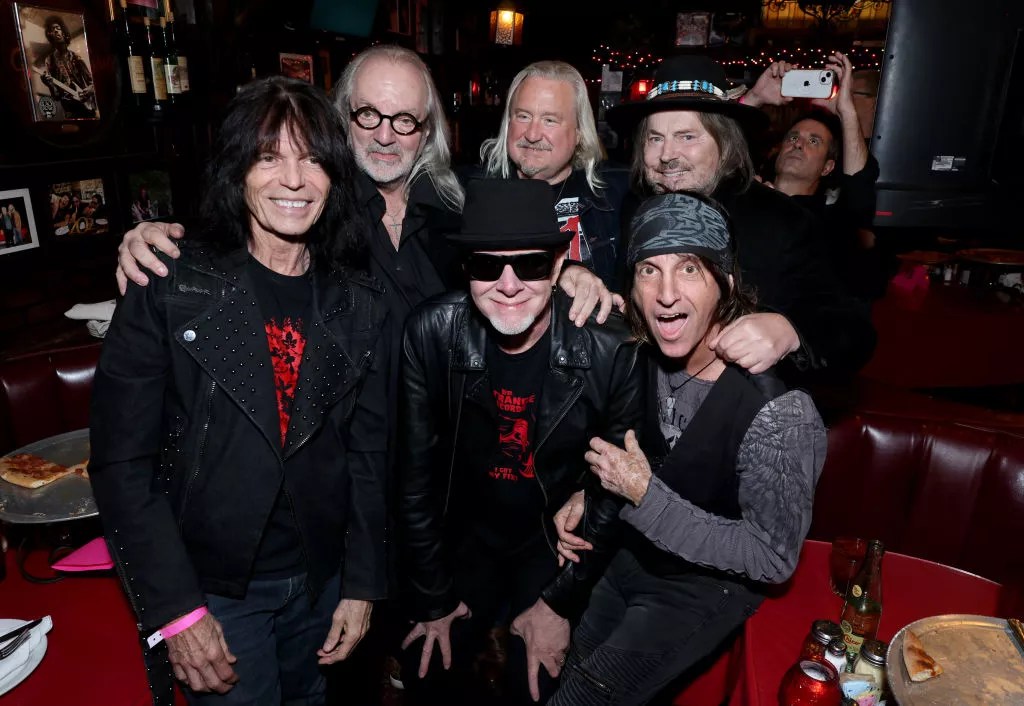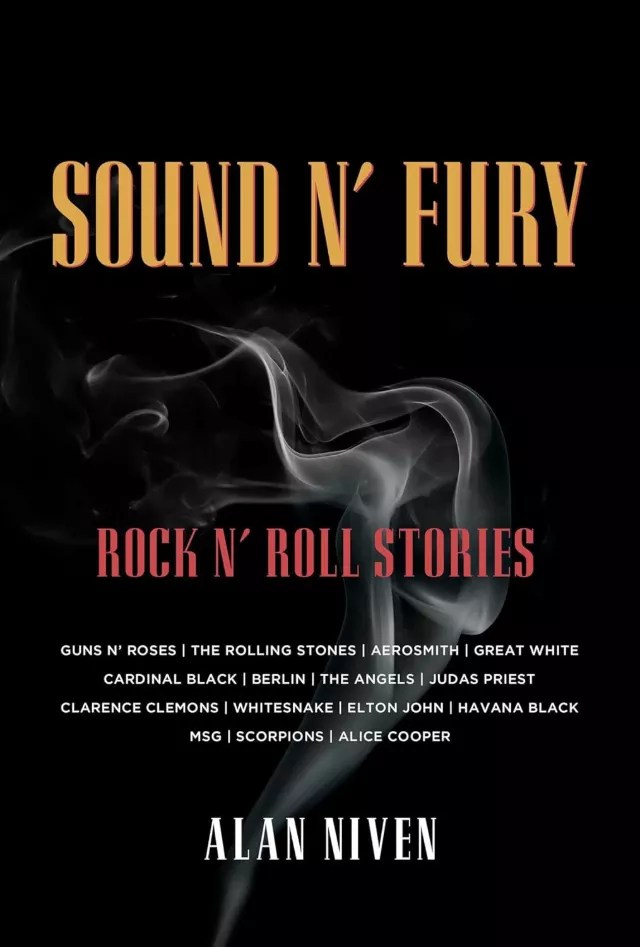
Alan Niven

Audio By Carbonatix
Alan Niven has always bet on long shots.
As the first manager to wrangle Guns N’ Roses – when no one else would – he helped shape their legend, only to be unceremoniously fired by Axl Rose, an act Loudwire called in 2024 as one of the “25 Most Destructive Guns N’ Roses Moments.” It was just one gamble in a career built on gut instincts and high stakes.
If you wander the sun-bleached streets of Prescott, Arizona, you might miss the legend living in plain sight. Niven has a knack for showing up where nobody expects him and turning chaos into history. His legacy runs deep: He steered “Appetite for Destruction” to become the best-selling debut rock album in history, guided Great White from the dive bars to the top of the charts, and left an unmistakable mark on everyone from Berlin to Clarence Clemons. Known for his blunt honesty and poetic instincts, Niven has always had a gift for seeing what others miss.
Now, decades after trading Sunset Strip neon for the quiet desert, where he started Tru-B-Dor Records and helped produce an array of incredible Arizona rock ‘n’ roll, Niven is opening the vault. He’s the most featured voice in the Paramount+ documentary “Nothing But A Good Time,” and this August, his memoir “Sound N’ Fury” promises an unvarnished look behind the velvet rope – backstage bedlam, creative triumphs, and the hard bargains that come with survival in rock ‘n’ roll. The book arrives alongside new music with songwriter/ producer/longtime collaborator Chris Catero, under his artist project The Imperfected. The song is a nod to Niven’s musical history, including a spoken word section done by Alan himself.
To sit down with Alan Niven is to sit at the crossroads of music history: stories spill out like smoke, laughter cracks the veneer, and somewhere in the background, the ghosts of rock ‘n’ roll raise a glass. His blend of candor, wit and poetic insight makes each conversation a lesson in rock history and the risks it takes to change it.
I loved the “Sing A Song for a Sixpence” chapter in Sound N’ Fury. I can just hear your voice reading it – if I hadn’t met you before, I’d feel the author’s unique voice and humor.
Writing this book is a monkey off my back. I did try to write a book before, but it was depressing. Because I think of the fuckups of all the wrongs and things we didn’t get done. Rock ‘n’ roll books all have the same story, but the names change. Starts out with the deprived childhood in the east end of London… then you get to when the band forms then the indivisible young guns against the world, then money, girlfriends, wives and mothers and whatever else, and things dissipate and fall apart, and then you get the blame, the finger pointing, and the incriminations, and the end of the book is boring.
So the first thing I had to avoid was chronological order, and just (have) a moment of self-awareness, that I’m an old jukebox in the corner of the kitchen, and people put in a quarter, and you tell a story, then another quarter and another story. So that’s how I did it: Just stories and vignettes, and to try and write it not for the fans – they know everything. There’s nothing that is unknown about these bands, especially Guns N’ Roses. So, I tried to write it for the curious.

(L-R) Rudy Sarzo, Alan Niven, Mark Kendall, Tom Zutaut, Don Dokken, and Mark Weiss attend the “Nothin’ But A Good Time” Event at Rainbow Bar & Grill on September 16, 2024, in Los Angeles, California.
Randy Shropshire/Getty Images for Paramount+
Was writing this more cathartic or difficult?
This time, I came around with great objectivity. The other thing about the book is that it’s not a Guns and Roses book; it’s not a Great White book; it’s not an Alan Niven book. It’s just a collection of stories. It’s a record, and each section is an individual track. And you don’t have to read the subsequent section to know what’s happening in the next. They each stand on their own.
Lauren, it blows my mind people are still interested in things that happened 30 years ago. If you came into the studio in 1986 and said this recording you’re doing today would still be playing on the radio in 30 years, I’d look at you and say, “Lauren, whatever you’re smoking, share it!” Because I’d love that optimism and viewpoint into the future. None of us expected things to last that long.
Looking back, what was one decision you made in an artist’s career that changed everything, for better or worse?
I’ve made innumerable decisions, for better or worse! We don’t go to college to do rock ‘n’ roll management. It was a way. Of life, 24 hours a day, 7 days a week. Well-versed managers are the enemy, protecting their band from exploitation of accountants, labels, publicists, etc., so you’re going to make a few mistakes, though. Thirty years ago, without embarrassment, make a small claim that one way or another, I got my fingerprint on something like 250 million sales spread.
I think that number in the balance means I made more good decisions than bad ones. It’s a good mentality to have. Now, whether I’m in love with any of those bands at this point, I feel, after contributing in a small way at the beginning, because I don’t think many of them are good people. Motley Crue are not good people.
Working at Virgin, I’ve learned something that has a little bit of profundity. And that is the power of saying yes. If somebody asked you to do something, you said, “Yeah, I could do that, no problem.” Then you walk out of the office and go, “Ah, fuck. How do I deal with this? How do I do that?” And you figure it out, you get it done. So that was ingrained in me, the sense of, if you’re not sure how it’s going to work, step through the door that is opening up to something broader. Then Adler (Steven), over a lunch, said, “We want you to manage us.” And I said, “I can’t do that. I know absolutely nothing about management.”
“Oh, we don’t care.” I think they were in love with the idea of having an English accent.

“Sound N’ Fury: Rock and Roll Stories” by Alan Niven.
ECW Press
In your book, you talked about how if you had maybe redirected more of that attention to, like, let’s say, Great White instead of Guns N’ Roses, then maybe their career would have gone on to be something different.
Well, the perspective of had I been more focused on Great White, is an interesting hypothesis. Hypothesis is speculation. If I had spent more time on, say, Great White, God knows what Jack (Russell, lead vocalist) might have gotten up to with his incredible powers of self-destruction. I stuck with artists or people I thought had the potential to be artists. I didn’t deal with entertainers. David Geffen tried to get me with Jon Bon Jovi – but he’s an entertainer.
So no, thank you. I want to be with artists. You have to think about, why are you doing this? Why is this significant to you? And one thing that I’ve wanted to stay close to is trying to identify people I saw a genuine artist, because artists are those who speak power, power to truth. The best rock ‘n’ roll is suspense, alienation, and brings people together by our own consent.
We live in an incredibly coercive world, rules for everything. How you drive, what your family thinks of what you wear, where you can put your garbage outside of your home. Everything is a coercion. But if you sit down with the guitar, and you play me a song, and I recognize your intelligent spirit, emotion, and song, that’s a willing bridge of humanity that performs between us. And that, I think, is very powerful, very worthwhile.
In Arizona, there are many incredible artists you’ve helped produce-Buck & Evans, Razer, Storm of Perception, Chris Buck, and Big Horns. Any other musical endeavors we can expect in the future?
I’m retired. However, rock ‘n’ roll is like malaria. It’s always in your bloodstream; it’s just whether you get a fever or not. Every now and then, it raises my temperature.
In terms of some of the things that we put the time and energy into that didn’t go anywhere, we were blacklisted in Hollywood, of things should have been given an opportunity. It wasn’t because they were, shall we say, not our friends? This is something that’s not a speculation. I feel bad about that, I feel bad for Razer and Storm of Peception and both of them should have had an opportunity. Also, a band called 3Eighty3, some kids out of Texas. Probably the best frontman that I’ve ever seen, but he died of cancer. There are no guarantees.
I look back with a sense of privilege because I was a part of an extraordinary experience, and part of that experience was to find answers that elude a lot of us. What would it be like for this to happen? The fear of anonymity, do I matter? Does anybody notice me? Am I really a part of this environment? Am I just a shadow walking amongst all the shadows? Well, I tell yourself that lose your anonymity and you go, oh, my God, it’s got a value. It really does. I mean, let’s look at Axl for a moment. Terrible childhood … but then it gets worse because then he has to spend the rest of his life being Axl fucking Rose. Because when he wakes up, he has to decide if he’s leaving his home, because if he does, he has to deal with the whole world pulling on him and seeing him. Fame is a demanding mistress.
You said in your book that you would have loved to work with a band like World Party or Tears for Fears. If you had the chance to manage or produce for any contemporary artist today, who would you choose, and why?
I’m spoiled. I fault the years 1964, 1974. And there’s nothing you can hear today that has class clarity of the power of the best Mo Town. Hollandaise Mo Town (Brian Holland, Lamont Dozier, and Eddie Holland, who were instrumental in shaping the sound of Motown Records).
So, someone who’s known, who already has a career? That’s a tough one. The same people write the same songs for all the successful artists. They write digitally and none of it has personality or memorability.
Let’s see. Taylor Swift. Some girl called Samantha? Sabrina Carpenter? They’re all recording songs that have been written by the same people. It’s just manufacturing power to distract. The other thing is there’s absolutely no social or political content whatsoever. And that leads me to thinking, well … in the late ’60s, we had Dylan and Lennon who had something to say. Why do we not have them today? Yes, drugs, LSD and hash, but now everyone wants to take ‘molly’ and jump up and down in a techno disco.
It’s entirely possible that one day, I will be sitting there and going, “Yeah, that sound is phenomenal,” and I might have enough energy to contribute, and if they want me to contribute, I will. Fucking large, and again, I suppose, you know, putting a book together is a little bit of the process. I think I’ve, you know, to take an ice hockey analogy, I’ve served my time on the ice.